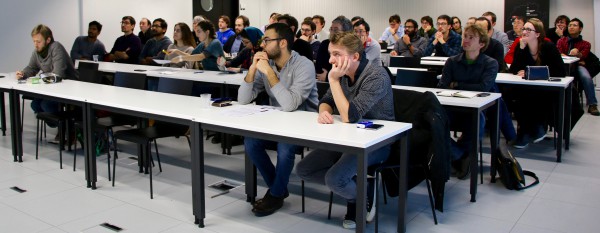MARVEL Junior Seminar — February 2021
Zoom meeting link:
https://epfl.zoom.us/j/93881551248
Password: 3417
The MARVEL Junior Seminars aim to intensify interactions between the MARVEL Junior scientists belonging to different research groups.
Each seminar consists of two presentations of 25 minutes each, allowing to present on a scientific question in depth, followed by time for discussion. The discussion is facilitated and timed by the chair.

MARVEL Junior Seminar Organizing Committee — Michele Kotiuga, Sara Fiore, Stefano Falletta, Kristians Cernevics, Max Veit and Patrick Mayor
Talk 1 — Efficient N-body representations in atomistic machine learning
Jigyasa Nigam, Michele Ceriotti
Laboratory of Computational Science and Modeling (COSMO), EPFL
The application of machine learning to the modeling of materials and molecules has proven to be extremely successful. This success can be largely attributed to the development of representations of atomic structure and composition that reflect physics-based concepts, such as symmetry and locality of interactions. A class of representations that is particularly effective and includes many commonly-used descriptors as special cases, relies on the evaluation of symmetrized N-point correlations of the atom-centered density. One of the drawbacks of this approach, however, is the exponential increase in the number of these features with increasing correlation order which has often been in the way of designing a complete, concise, and efficient description. To this end, we have recently proposed an N-body iterative contraction of equivariant (NICE) features, that eliminates the exponential scaling in the procedure.
This approach involving local densities, however, is still unable to capture physical effects that have a long-range behavior such as electrostatic interactions. A possible solution to the long-range problem involves the construction of multi-scale features, built as a combination of the atomic density field, and a "potential field" that can be obtained formally by solving the Poisson equation for the atomic density. The simplest version of these features can be shown to be formally related to the multipole expansion of permanent electrostatics, but the combination of physics-based construction and data-driven regression scheme allows us to capture also more subtle interactions such as polarization and quantum delocalization.
In this seminar, I will give an overview of these representations and these proposed solutions that pave the way to systematically improvable, symmetry-adapted atomistic machine learning.
Talk 2 — Ab initio calculation of Hall mobility in semiconductors
Samuel Poncé1, Francesco Macheda2, Elena Roxana Margine3, Nicola Marzari1, Nicola Bonini2, Feliciano Giustino4
1 Laboratory of Theory and Simulation of Materials (THEOS), EPFL
2 Dept. of Physics, King's College London UK
3 Dept. of Physics, Applied Physics and Astronomy, Binghamton University-SUNY, USA
4 Dept. of Physics, University of Texas at Austin, USA
In this talk, we will probe the accuracy limit of ab initio calculations of drift [1] and Hall [2] carrier mobilities that relies on the electron-phonon coupling, within the framework of the Boltzmann transport equation [3] for 10 semiconductors.
In particular, we consider the effect of spin-orbit coupling, optimal Wigner-Seitz cell construction, dynamical quadrupoles, iterative solution of the Boltzmann transport equation as well as the self-energy relaxation time approximation.
These calculations require extremely fine sampling of the Brillouin Zone which is made possible at an affordable computational cost through the use of efficient Fourier-Wannier interpolation of the electron-phonon matrix elements as implemented in the EPW code (https://epw-code.org).
[1] S. Poncé, E. R. Margine and F. Giustino, Phys. Rev. B 97, 121201 (2018)
[2] F. Macheda and N. Bonini, Phys. Rev. B 98, 201201 (2018)
[3] S. Poncé, W. Li, S. Reichardt, and F. Giustino, Rep. Prog. Phys. 83, 036501 (2020)
Check the list of the next MARVEL Junior Seminars here.
Low-volume newsletters, targeted to the scientific and industrial communities.
Subscribe to our newsletter